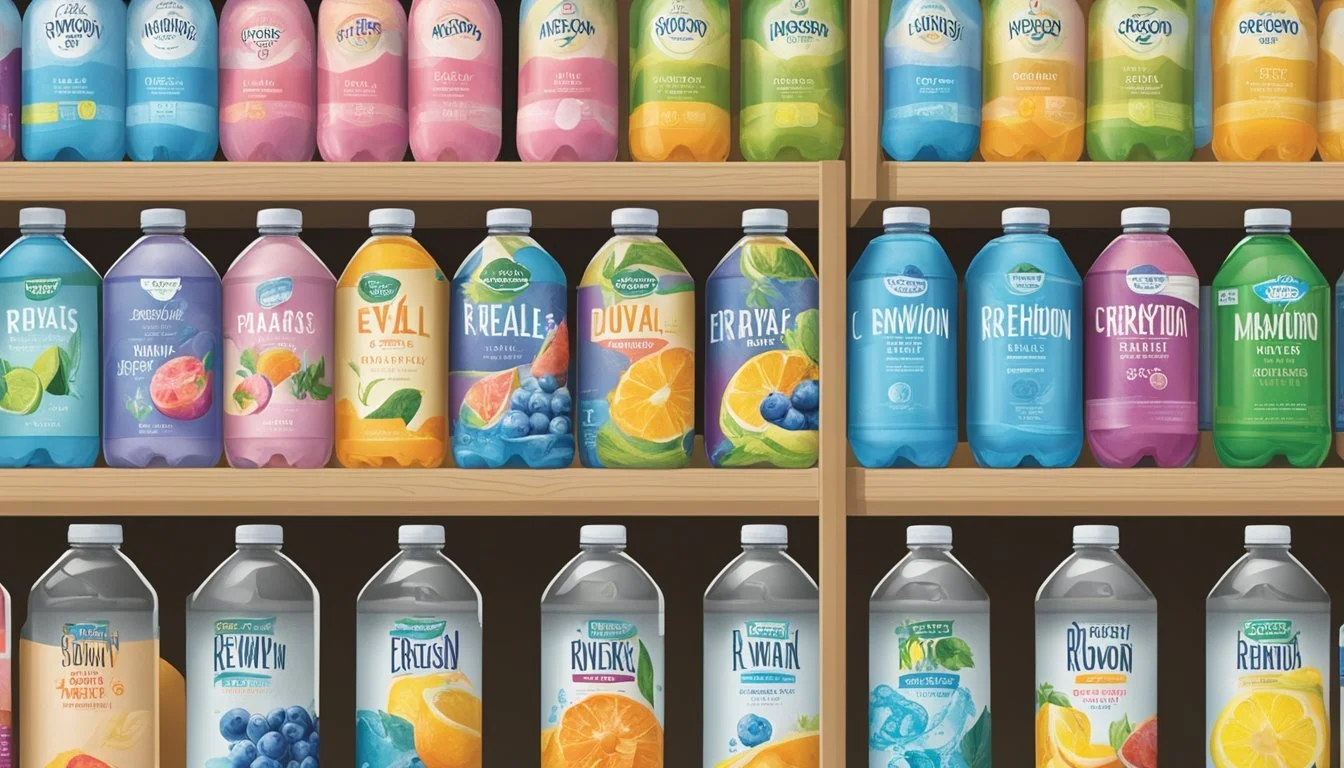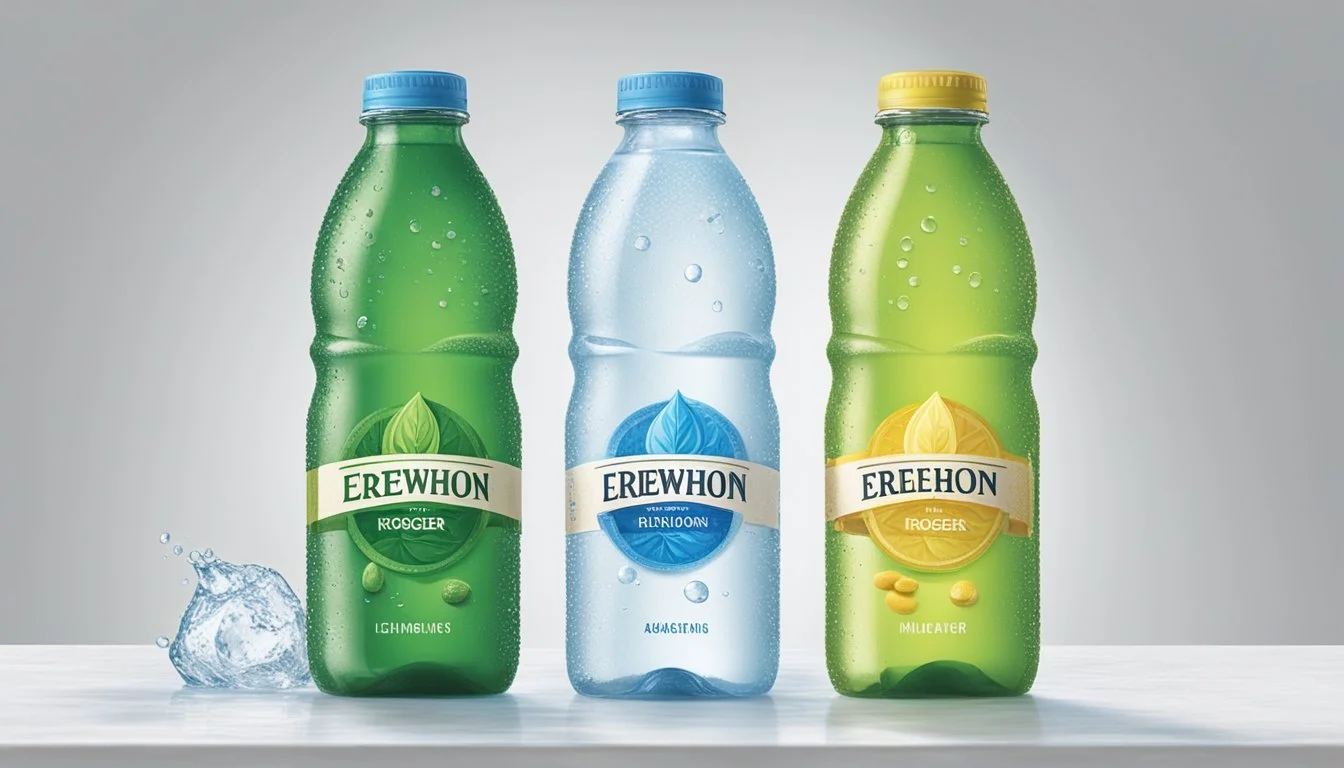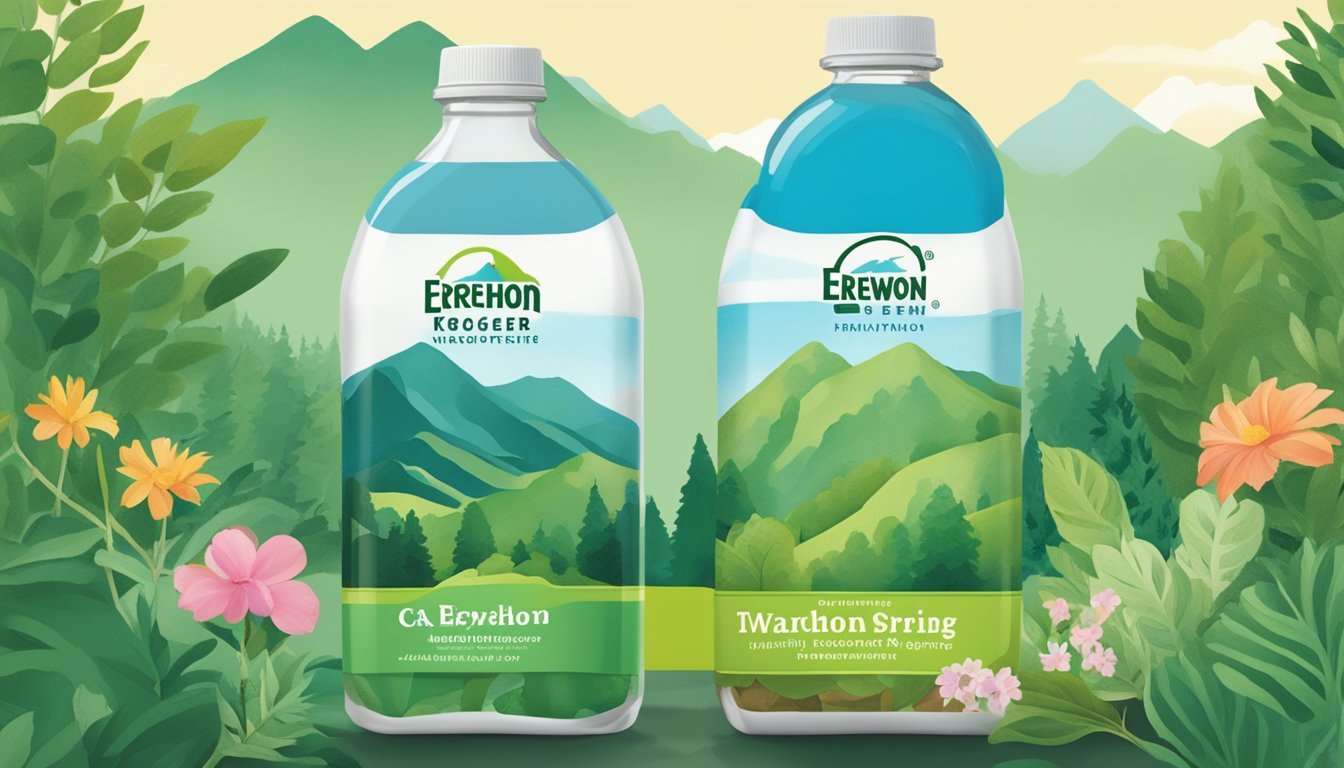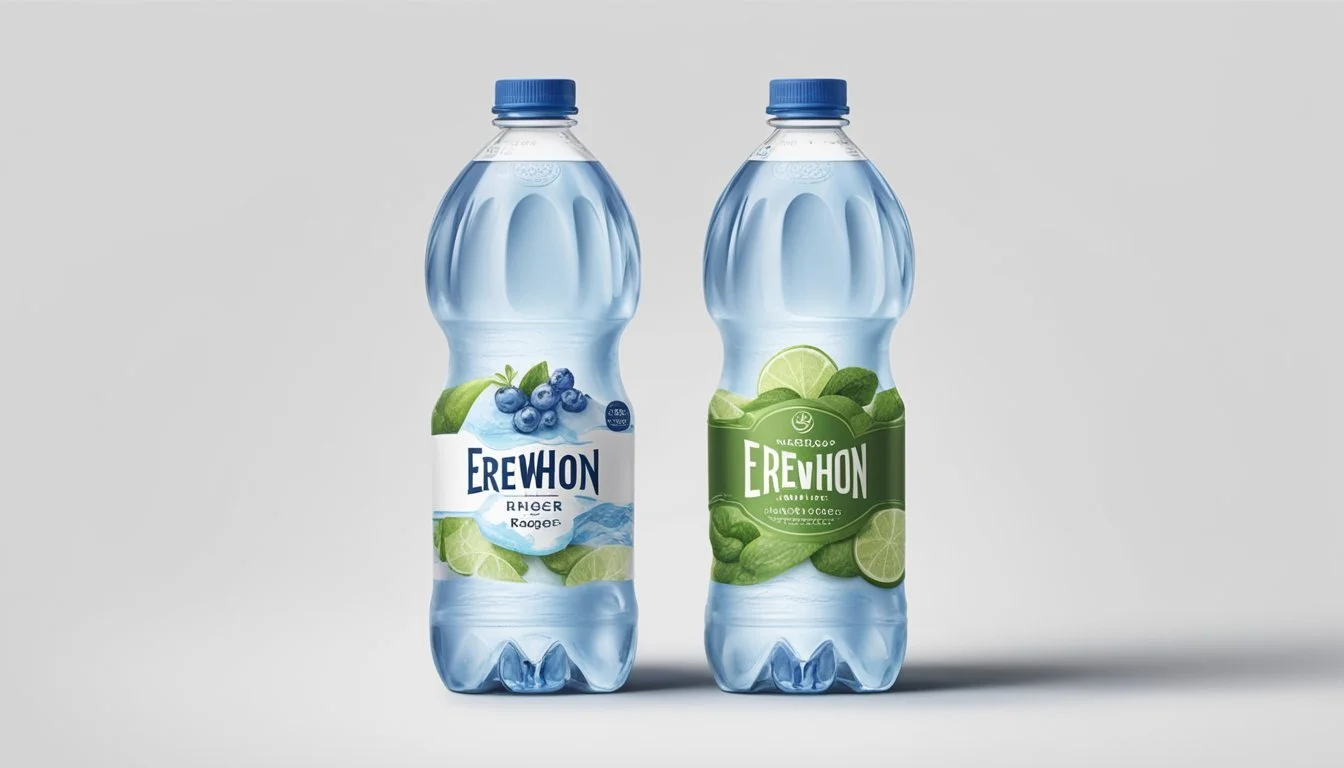Erewhon vs. Kroger
Which Bottled Water is Better? Comparison of Quality and Value
When it comes to choosing bottled water, health and taste are paramount for many consumers. Erewhon and Kroger offer two distinct options in the crowded bottled water market, each with its own attributes. Erewhon is known for its premium quality and commitment to health, often sourced from pristine springs, promising a purer and cleaner taste.
Kroger, on the other hand, adheres to strict FDA regulations to ensure safety, yet questions about its water quality, especially concerning contaminants like microplastics, have been raised. While both brands strive to deliver safe drinking water, Erewhon generally offers a superior taste and higher quality, reflecting its premium price point.
Ultimately, the decision between Erewhon and Kroger's bottled water may come down to individual priorities—whether it's the perceived health benefits and taste of Erewhon or the cost-effectiveness and widespread availability of Kroger.
Comparing Water Quality
When evaluating the quality of Erewhon and Kroger bottled waters, it's critical to consider their source, treatment methods, and adherence to safety standards and regulations. These factors play a significant role in determining the purity and overall safety of the water.
Source and Treatment
Erewhon sources its water from natural springs, promoting a higher mineral content that many consumers find appealing. This water undergoes minimal processing to preserve its natural qualities. Filtration processes include activated carbon and UV light treatments to remove contaminants without affecting mineral content.
In contrast, Kroger's bottled water typically derives from municipal sources. This means the water may undergo extensive treatment to meet safety standards. The treatment often includes reverse osmosis and ozonation, ensuring contaminants like lead, arsenic, and microplastics are filtered out, but also potentially stripping the water of beneficial minerals.
Safety Standards and Regulations
Both Erewhon and Kroger adhere to strict safety standards set by the Environmental Protection Agency (EPA) and Food and Drug Administration (FDA). Erewhon prides itself on surpassing legal limits for contaminants, maintaining rigorous testing protocols to ensure no harmful levels of substances like heavy metals or arsenic are present.
Kroger also meets EPA and FDA regulations, including bottled water guidelines that cap allowable levels of contaminants. Regular testing within FDA-approved laboratories ensures compliance with these standards. Kroger's bottling processes have made strides in reducing BPA usage, addressing consumer concerns about plastic pollutants.
In summary, Erewhon focuses on natural purity with minimal processing, while Kroger emphasizes extensive treatment for comprehensive safety. Both brands ensure compliance with strict regulatory standards, but their approaches to sourcing and treatment provide different advantages regarding mineral content and contaminant removal.
Water Source and Sustainability
Kroger and Erewhon bottled water brands differ significantly in their water sourcing and environmental impact. Understanding these differences can help consumers make informed choices.
Bottled Water Brands
Erewhon sources its water from natural springs, providing a more pristine origin compared to municipal sources. The focus here is on spring water, which often appeals to consumers looking for a natural and untouched source.
Kroger bottled water, on the other hand, is typically sourced from municipal supplies. This is essentially treated tap water. Brands like Aquafina and Dasani also follow similar practices, ensuring the water is safe for consumption but often raising concerns about added chemicals.
Spring water tends to have a fresher taste due to its natural minerals. In contrast, water from municipal sources is rigorously purified but may lack these natural minerals, impacting the flavor profile.
Environmental Impact Assessment
Erewhon prioritizes sustainability, often using eco-friendly packaging such as recyclable or biodegradable materials. This approach aims to reduce the overall environmental impact by minimizing waste and pollution.
Kroger uses standard plastic bottles, which contribute to environmental concerns like plastic pollution and waste. Despite some bottles being BPA-free, the use of plastic remains a significant issue.
Consumers concerned about the environmental impact may prefer Erewhon for its commitment to reducing plastic use. Meanwhile, switching to brands with eco-friendly initiatives can help mitigate the environmental footprint of bottled water consumption.
Health and Hydration
When comparing Erewhon and Kroger bottled water, it is important to understand the implications for both hydration and health. Both brands offer essential hydration benefits, but their impact on health varies due to differences in mineral content and potential contaminants.
Hydration Benefits
Hydration is crucial for maintaining bodily functions. Erewhon bottled water, known for its high-quality sourcing, often contains natural minerals and electrolytes. These elements aid in efficiently replenishing fluids lost through daily activities and exercise. The presence of minerals like calcium and magnesium in Erewhon water can enhance hydration by promoting better absorption.
Kroger bottled water also helps keep the body hydrated similarly. It adheres to FDA regulations to ensure safety and quality. Some Kroger products may include added electrolytes for improved hydration. Both brands meet the basic need for hydration, but Erewhon's naturally occurring minerals may offer a slight edge in maintaining optimal body fluid balance.
Impact on Health
Health considerations are integral when choosing bottled water. Erewhon bottles often avoid harmful chemicals, promoting better health. The absence of bisphenol A (BPA) in many Erewhon bottles reduces exposure to endocrine disruptors, supporting liver and hormonal health.
Kroger bottled water is similarly compliant with health standards. Concerns about microplastics and BPA persist, although many Kroger bottles are now BPA-free. Continual consumption of water with microplastics may have long-term health consequences. Erewhon's focus on natural purity might offer fewer risks related to contaminants, making it potentially healthier for long-term consumption. Both brands aim to provide safe drinking water, but Erewhon may have an advantage with its natural, mineral-rich composition.
Taste and Water Composition
Erewhon and Kroger bottled waters vary in taste and mineral content, providing distinct experiences for consumers. Each water source and purification method influences these differences.
Flavor Profiles
Erewhon bottled water often comes from natural springs, resulting in a clean, crisp taste. Consumers describe its flavor as smooth with a subtle sweetness due to natural minerals. Their water undergoes minimal processing to retain natural characteristics.
Kroger bottled water, typically sourced from municipal supplies, undergoes extensive purification, including reverse osmosis. This process removes most contaminants, resulting in a pure taste with less noticeable flavor. Some users note a lack of distinct taste compared to natural spring water.
Mineral and Electrolyte Content
Erewhon spring water contains naturally occurring minerals and electrolytes like calcium, magnesium, and potassium. These contribute to its flavor and provide health benefits like improved hydration and bone health. The mineral content varies depending on the spring source, making each batch slightly different.
Kroger's purified water, often treated by reverse osmosis, lacks naturally occurring minerals. Some variants might have added minerals post-purification for taste and health benefits, but in lower concentrations than natural spring water. The consistency of its mineral content ensures a uniform taste across all bottles.
Brand Analysis: Erewhon vs. Kroger
Erewhon and Kroger represent different approaches to the bottled water market, with variations in pricing, brand reputation, and market presence. This section dissects these attributes to help consumers make an informed choice between the two brands.
Price Comparison
Erewhon is known for being a luxury organic grocer, which reflects in the pricing of its bottled water. Erewhon’s water often carries a premium price tag, catering to consumers seeking high-quality, organic products.
In contrast, Kroger's bottled water is more economically priced, targeting a broader audience. Kroger offers affordable options that comply with FDA regulations. This makes it suitable for cost-conscious consumers who prioritize basic quality and safety standards over luxury.
Brand Reputation and Transparency
Erewhon has built a reputation as a health-food mecca, especially in Los Angeles. Known for turning smoothies and organic products into cultural symbols, Erewhon emphasizes quality and exclusivity.
Kroger, a nationwide grocery chain, maintains a reputation for reliability and affordability. They ensure their bottled water meets safety and quality regulations, but concerns about contaminants like microplastics and BPA persist. Many of their bottles are now BPA-free, reflecting efforts to improve transparency and product safety.
Market Presence
Erewhon operates a limited number of stores, mainly in Los Angeles, which has helped maintain an air of exclusivity. Despite having only 10 stores, Erewhon has amassed significant Earned Media Value (EMV), suggesting a strong brand impact relative to its size.
Kroger, with its vast network of over 2,700 stores across the U.S., has a far greater market presence. This extensive reach allows Kroger to serve a diverse customer base, making its bottled water widely accessible and reinforcing its status as a household name in grocery retail.
Packaging and Environmental Considerations
Erewhon and Kroger approach bottled water packaging with varying degrees of sustainability and innovation. Each brand has commitments to environmental impacts, focusing on different aspects like material choices and reusable options.
Sustainability of Packaging
Kroger uses conventional plastic bottles for most of its packaging. Although these bottles adhere to FDA regulations, the environmental impact is significant. The production, transportation, and disposal of plastic bottles contribute to pollution and waste.
Microplastics and BPA concerns, despite many bottles now being BPA-free, still arise. On the other hand, Erewhon aims to minimize its environmental footprint by using more eco-friendly packaging. They explore options like recycled plastic and even biodegradable materials, showcasing a commitment to sustainability.
Reusable and Alternative Packaging
Erewhon encourages the use of reusable bottles and provides incentives for customers who bring their own. They offer water in glass bottles and biodegradable cartons, reducing plastic waste. Transparency about the water source and packaging information is a key aspect of their strategy to foster consumer trust.
Kroger, though less aggressive in this area, has started introducing initiatives for recycling plastic bottles. However, they lag behind Erewhon in providing significant reusable or alternative packaging options. This difference highlights Erewhon's proactive sustainability measures compared to Kroger's more traditional approach.
Regulatory Compliance and Standards
Examining the regulatory compliance and standards for Erewhon and Kroger bottled water involves understanding the distinctions between FDA and EPA regulations and reviewing consumer reports on compliance.
FDA vs. EPA Standards
The U.S. Food and Drug Administration (FDA) regulates bottled water as a food product. FDA standards include:
Standards of Identity: Defines types of bottled water.
Good Manufacturing Practices: Governs production processes.
Labeling Requirements: Dictates information on labels.
In contrast, the Environmental Protection Agency (EPA) regulates tap water. The EPA enforces the Safe Drinking Water Act, ensuring safety through:
Maximum Contaminant Levels: Legal limits for contaminants.
Water Testing: Routine checks for compliance.
Public Reports: Informing consumers of water quality.
Both Erewhon and Kroger bottled waters comply with FDA regulations, differentiating them from tap water regulated by the EPA.
Compliance and Consumer Reports
Consumer reports and investigations into water quality provide insight into compliance. Bottled water must adhere to FDA’s Quality Standards listed in 21 CFR, ensuring purity and safety.
Studies reveal that many bottled brands, including Kroger, meet these standards but can still contain microplastics or chemical contaminants. Erewhon focuses on maintaining high standards by sourcing water from natural springs and conducting rigorous testing.
Additionally, environmental reports highlight plastic waste concerns associated with bottled water. Ensuring compliance with both FDA regulations and addressing environmental impacts is crucial for consumer confidence. Comprehensive testing and transparent reporting are essential for maintaining trust.
Consumer Insights and Preferences
The bottled water market reveals clear preferences and loyalty patterns among consumers, driven by both product quality and brand identity.
Market Trends and Analysis
The bottled water industry has seen significant growth, with global sales increasing by 73% between 2010 and 2020. Consumers are gravitating towards brands that promise purity and transparency.
Flavor and perceived health benefits significantly influence consumer choices. Brands like Erewhon emphasize their natural water sources, appealing to health-conscious buyers.
Environmental concerns play a crucial role, as many consumers now prefer options that offer BPA-free bottles or recycled materials. Feedback from various polls indicates a growing trend toward sustainable packaging.
Brand Loyalty and Community Engagement
Brand loyalty thrives on trust and quality. Erewhon’s commitment to high-quality, naturally sourced water has built a loyal customer base, especially among those who prefer premium options.
Kroger, while meeting safety standards, faces challenges with perceptions related to contaminants like microplastics. However, efforts to use BPA-free bottles have positively impacted consumer trust.
Community engagement via email campaigns and social media interactions strengthens brand loyalty. Erewhon frequently engages with its community through informative content, fostering a sense of togetherness and trust.
Kroger also employs customer feedback to improve and adapt, focusing on resolving consumer concerns and improving product quality.
Conclusion
Choosing between Erewhon and Kroger bottled water requires evaluating various criteria such as taste, quality, environmental impact, and cost. Both brands offer distinct advantages and drawbacks that may appeal differently to consumers.
Erewhon bottled water is often praised for its premium quality and has a reputation for purity. It is sourced from natural springs and undergoes minimal processing, maintaining a clean taste.
Kroger bottled water adheres to FDA regulations, ensuring safety and quality. Though it is more affordable, it has faced scrutiny over concerns like microplastics and contaminants. Many bottles are now BPA-free, addressing some health concerns.
Cost Comparison:
Erewhon: Higher price point.
Kroger: Budget-friendly option.
Environmental Impact:
Erewhon: Uses eco-friendly packaging and supports sustainability.
Kroger: Less emphasis on sustainability, leading to higher environmental concerns.
Quality and Taste:
Erewhon: Known for exceptional taste and purity.
Kroger: Reliable but may contain slight aftertastes and tend to have more additives.
Recommendations:
For those prioritizing quality and environmental sustainability, Erewhon is a better choice.
For cost-conscious consumers who need a reliable daily source, Kroger offers good value.
Consumers should base their decision on personal priorities, whether it be cost, taste, purity, or environmental considerations. Both brands have their strengths, making them suitable for different needs and preferences.
More About Erewhon
Erewhon vs Kirkland Signature: Which Bottled Water is Better?
Erewhon vs Richard's Rainwater: Which Bottled Water is Better?
Erewhon vs Whole Foods Italian Still Mineral water: Which Bottled Water is Better?
Icelandic Glacial vs Erewhon: Which Bottled Water is Better?
Mountain Valley Spring Water vs Erewhon: Which Bottled Water is Better?





